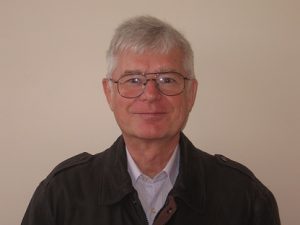Name: Oleh Wolowyna
Current Hometown: Chapel Hill, North Carolina
Current Position: Research Fellow, Center for Slavic, Eurasian and East European Studies at the University of North Carolina-Chapel Hill; Director of the Center for Demographic and Socio-economic Research of Ukrainians in the U.S. at the Shevchenko Scientific Society U.S.
Professional Interests: Demography and sociology of Ukrainians in the U.S. and Canada; demographic situation in Ukraine; language and identity; comparative research of Holodomor
Why did you decide to join the Shevchenko Scientific Society?
When I was growing up in Argentina, I was very active in the Ukrainian community in Buenos Aires. Since my arrival in the U.S., I always lived in places where there was no organized Ukrainian community. Thus, I had little or no contact with Ukrainian organizations in the U.S. and was not familiar with the Shevchenko Scientific Society. When I started researching Ukrainians in the U.S. as a Ph.D. student, I got acquainted with scholars working on this topic at the Ukrainian Center for Social Research in New York and the Harvard Ukrainian Research Institute. One of these scholars (I cannot remember his name) suggested I join the Shevchenko Society and I was elected full member in 1988.
What do you value about membership in the Society? What is your most memorable Society’s event or publication?
The Society provided me the opportunity to meet experts in Ukrainian studies from different disciplines, a forum for exciting scholarly debates and a solid platform for expanding my research on Ukrainian topics. As Chairman of the Society’s Grants Committee, I had the opportunity to provide financial assistance to researchers in the U.S. and Ukraine for researching different aspects of Ukrainian studies and support the presentation of papers at international scholarly conferences. An important event was the creation in 2009, at my suggestion, of the Center for Demographic and Socio-economic Research of Ukrainians in the U.S. I have been Director of the Center since its creation. The Center has constructed a comprehensive database on Ukrainians in the U.S. and many results based on the database have been published at the Center’s web site: http://inform-decisions.com/stat/. The web site is consulted daily by scholars, students, universities, government and private organizations in the U.S., Ukraine and countries from all over the world. Numerous scholarly and general articles have been published using the database. An Atlas on Ukrainians in the U.S. will be published this year.
How did your interest in Ukrainian culture and society influence your career path?
Research on Ukrainian topics has always been one of my priorities. Due to the nature of my professional career, I did not have many opportunities to research Ukrainian topics and most of this work had to be done in my spare time. Since my retirement, I have been able to work on this full time. My areas of expertise are demography and sociology. Compared to other ethnic groups, research on Ukrainians in these areas has been very limited in the U.S. and Canada. I have been trying to fill the gap and would like to invite interested scholars to conduct quantitative research on Ukrainians in the U.S. The Center can provide you with a very rich data set and technical assistance (olehw@aol.com).
What is your current research/work project?
Besides demographic and sociological research on Ukrainians in the U.S. and Canada, I have been working for the last five years on the Holodomor and comparative research of the 1932-1933 Famine in other parts of the Soviet Union. My work in these areas started thanks to the first of my two Fulbright research grants in Ukraine. With the support of the Harvard Ukrainian Research Institute and the Ukrainian Studies Fund, I organized a group of demographers and historians in Ukraine and the U.S. that has been working on this topic for the last four years. We were able to gather very detailed demographic data for Ukraine and Russia and this allowed us to make detailed analyses at the national and regional levels. We have published several articles and a book chapter on this topic (our publications can be accessed at: http://www.inform-decisions.com/holodomor/. Our main priority is to publish research on this topic in Western peer-reviewed journals and scholarly books, as this is the only way that the international scholarly community will recognize a more balanced narrative about the Holodomor.
What career advice would you give for new members of the Shevchenko Scientific Society?
For many years the Ukrainian diaspora considered itself the true representative of Ukraine and its people. In the scientific sphere, the two key institutions have been the Shevchenko Scientific Society and the Ukrainian Academy of Arts and Sciences. Their work counteracted Soviet misinformation and made significant contributions to Ukrainian science. The situation has changed drastically with the independence of Ukraine. The role of a diaspora of an independent country is very different from the one we have been used to for many years. It requires a very different way of thinking and acting. This transformation is not easy and cannot be achieved without the active participation of a new generation of community leaders and scholars.
The Shevchenko Scientific Society provides an excellent platform for this transformation in the scientific sphere. Examples of challenges for new members of the Society are: a) what can I contribute to the scientific knowledge about Ukraine in my discipline; b) how to collaborate with scientists in Ukraine; c) how to interest my colleagues to research Ukrainians topics. More generally, what should be the role of the Shevchenko Scientific Society in the U.S., vis-à-vis the National Academy of Sciences of Ukraine and Ukrainian universities?
